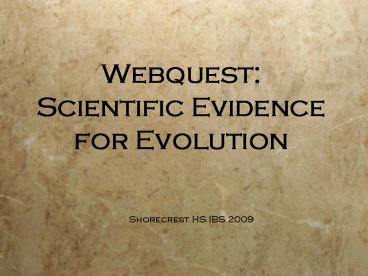Webquest: Scientific Evidence for Evolution - PowerPoint PPT Presentation
1 / 14
Title:
Webquest: Scientific Evidence for Evolution
Description:
http://www.pbs.org/wgbh/nova/id/pred-nf. ... http://www.pbs.org/wgbh/nova/id/transitional.html ... http://www.pbs.org/wgbh/evolution/darwin/origin/index.html ... – PowerPoint PPT presentation
Number of Views:126
Avg rating:3.0/5.0
Title: Webquest: Scientific Evidence for Evolution
1
Webquest Scientific Evidence for Evolution
Shorecrest HS IBS 2009
2
Directions
- As you proceed through this webquest, record all
work on the graphic organizer - Remember to print and put it in your lab notebook
along with the coloring sheet by the due date,
29/30 October.
3
Like all good scientific theories, evolution must
have scientific evidence to support it
- This evidence falls into 8 or more important
categories - 1. Fossil Record
- 2. Homologous structures
- 3. Analogous structures
- 4. Vestigial structures
- 5. Geographical distribution
- 6. Embryological studies
- 7. Genetic biochemical comparisons
- 8. Resistance to antibiotics pesticides
4
Define the theory of evolution
- Go to the following site for information and then
define the the theory in your own words - Interactive Site
- http//www.pbs.org/wgbh/nova/id/predictions.html
- Printable version
- http//www.pbs.org/wgbh/nova/id/pred-nf.html
5
1 Fossil Record
- A. Why are fossils considered part of the
scientific data that supports Evolution?
Watch the quick time video and read the text on
this page http//www.pbs.org/wgbh/evolution/libra
ry/04/3/l_043_01.html
Visit this website to learn about transitional
forms http//www.pbs.org/wgbh/nova/id/transitiona
l.html
6
1 Fossil Record (cont.)
- B. What evidence did scientists use to determine
the fossil they found was that of a whale? - C. How do scientists use fossils to learn when
whale ancestors were living on earth? - Watch the 10 minute video (Video 3 How Do We
Know Evolution Happens) to learn about these
questions and answer them in your notebook - http//www.pbs.org/wgbh/evolution/educators/teachs
tuds/svideos.html
7
2 Homologous structures
- A. Color-code the homologous structural parts on
the sheet "Adaptive Radiation Mammalian
Forelimbs." - B. What are homologous structures?
- C. Why are these considered evidence for Adaptive
Radiation or Divergent Evolution?
http//www.pbs.org/wgbh/evolution/darwin/origin/in
dex.html
http//evolution.berkeley.edu/evolibrary/article/s
imilarity_hs_01
8
3 Analogous structures
- A. What are analogous structures?
- B. How is this evidence for Convergent Evolution?
- http//evolution.berkeley.edu/evolibrary/article/s
imilarity_hs_01
9
4 Vestigial structures
- A. What are vestigial structures?
- Give an example of a vestigial structure in
humans. - Give an example of a vestigial structure in some
other organism. - B. Why are vestigial structures considered
evidence for evolution? - http//www.livescience.com/animals/top10_vestigial
_organs.html
10
5 Geographical Distribution
- A. What did Wallace and Wegener discover?
- How does their evidence support the theory of
evolution? - http//evolution.berkeley.edu/evolibrary/article/0
_0_0/history_16
11
6 Embryology
- A. What is embryology?
- Compare the stages of development illustrated on
the sheet "Comparative Embryology" and in the
diagrams in the Glencoe textbook (Page 433,
Figure 18.11) - Create a branching diagram (like a family tree)
which shows the degree of relationship the
animals listed in these pictures (6 total) based
on the similarity of their embryos - Draw your labeled diagram in your notebook or on
the back of the organizer - B. How do embryological studies provide evidence
for evolution?
12
7. Genetic Biochemical AND8. Resistance to
antibiotics pesticides
- We will study these two types of evidence later
this year, so leave 7 and 8 blank for now
13
More Connections Lucy
A. Where was Lucy found? B. How old is she? C.
What does Lucy tell us about evolution?
http//www.wsu.edu8001/vwsu/gened/learn-modules/t
op_longfor/timeline/afarensis/afarensis-a.html ht
tp//lucyexhibition.com/lucys-discovery.aspx
14
More Connections Hydrothermal Vents
- A. What evidence did we learn about in the
Hydrothermal vent unit that supports the theory
of evolution?































